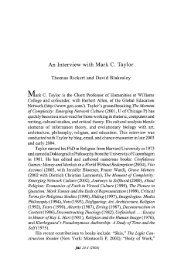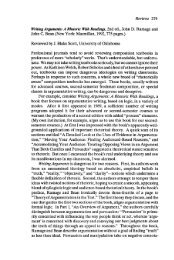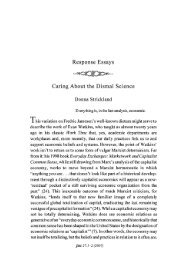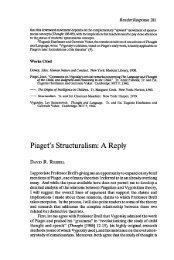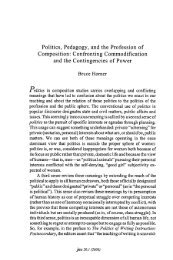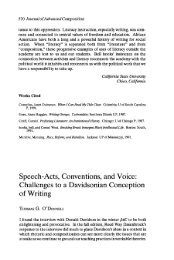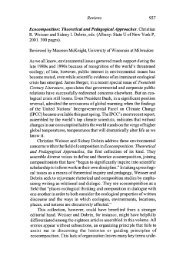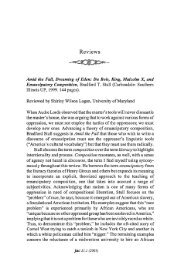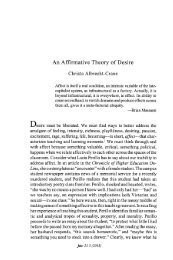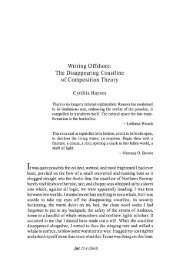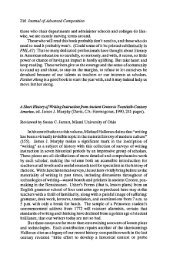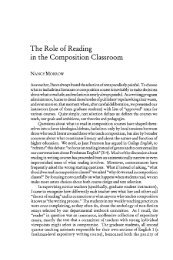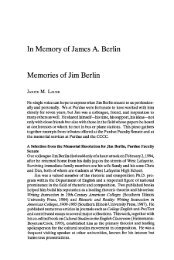Narrative Topic and the Contemporary Science Essay ... - JAC Online
Narrative Topic and the Contemporary Science Essay ... - JAC Online
Narrative Topic and the Contemporary Science Essay ... - JAC Online
You also want an ePaper? Increase the reach of your titles
YUMPU automatically turns print PDFs into web optimized ePapers that Google loves.
122 Journal of Advanced Compositiol.l<br />
3Forexample, Debra Joumet of <strong>the</strong> University of Louisville has delivered several<br />
excellent papers on Oliver Sacks <strong>and</strong> science essayists in general at <strong>the</strong> 1987 MLA <strong>and</strong><br />
1988 CCCC conventions, <strong>and</strong> I have published articles in <strong>the</strong> Journal of Advanced<br />
Composition <strong>and</strong> Freshman English News on similar topics.<br />
4Eiseley devotes a good deal of space to <strong>the</strong>se current controversies in The<br />
Immense Journey.<br />
sEiseley carries his defense of "mystical" reflection <strong>and</strong> storytelling a step<br />
fur<strong>the</strong>r in Lost Notebooks when he argues that straight science can address "how"<br />
but not "why" questions: "By <strong>the</strong> nature of things we are denied a scientific answer<br />
to <strong>the</strong> question Why? We can only accept <strong>the</strong> universe as given <strong>and</strong> proceed to examine<br />
how it seems to operate. Scientists toy successfully by observation to answer <strong>the</strong><br />
question How? Upon <strong>the</strong> Why? scientists can only speculate" (106).<br />
Works Cited<br />
Berlin, James. Writing Instruction in Nineteenth-Century American Colleges.<br />
Carbondale,IL: Sou<strong>the</strong>rn lllinois UP, 1984.<br />
-. "John Genung <strong>and</strong> <strong>Contemporary</strong> Composition Theory: The Triumph of <strong>the</strong><br />
Eighteenth Century." Rhetoric Society Quarterly 2 (1981): 74-84.<br />
Britton, James, et al. The Development of Writing Abilities (11-18). London:<br />
Macmillan Education, 1975.<br />
Burke, Kenneth. A Grammar of Motives. Berkeley: U of California P, 1969.<br />
Clegg, Cyndia Susan. Critical Reading <strong>and</strong> Writing Across <strong>the</strong> Disciplines. New<br />
York: Holt, 1988.<br />
Comley, Nancy R, ed., et al. Fields of Writing. New York: St Martin's, 1987.<br />
Conners, Robert. "The Rise <strong>and</strong> Fall of <strong>the</strong> Modes of Discourse." College<br />
Composition <strong>and</strong> Communication 32 (1981): 444-55.<br />
D'Angelo, Frank 1. A Conceptual Theory of Rhetoric. Boston: Little, 1975.<br />
Eiseley, Loren. The Immense Journey. New York: R<strong>and</strong>om, 1957.<br />
-. The Lost Notebooks of Loren Eiseley. Ed. Kenneth Heuer. Boston: Little, 1987.<br />
-. "Silent Bones <strong>and</strong> Fallen Kingdoms. " Natural History 96.6 (1987): 20,22-27.<br />
Gould, Stephen Jay. The Flamingo's Smile. New York: Norton, 1985.<br />
Havelock, Eric A. Preface to Plato. Cambridge: Belknap P of Harvard UP, 1963.<br />
Iser, Wolfgang. The Act of Reading. Baltimore: Johns Hopkins UP, 1978.<br />
Kinneavy, James L. A Theory of Discourse. Englewood Cliffs, NJ: Prentice,1971.<br />
Ong, Walter J. Orality <strong>and</strong> Literacy. London: Methuen, 1982.<br />
Plato. Gorgias. Trans. W.C. Helmbold. Indianapolis: Bobbs, 1952.



